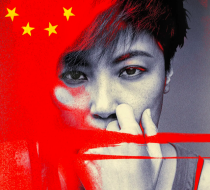Raise Your Umbrellas: How Denise Ho went from Cantopop queen to pro-democracy activist Favorite
In Hong Kong in 2014 the song Raise Your Umbrella by Denise Ho and Anthong Wong became an anthem for the pro-democracy movement known as the Umbrella Revolution. The song was written after police fired tear gas into the crowds when protestors filled the streets.
Ho was known as the "queen of Cantopop," the sexy and progressive Cantonese-language pop music centred in Hong Kong. Not long before the protests, Ho came out as a gay woman. In a new feature in The New Yorker, staff writer Jiayang Fan writes about the price Ho has paid for standing up and standing out. The story is also an examination of the relations between mainland China and Hong Kong, in the corridors of power and in the streets.
Ho didn't just sing about the Umbrella Revolution, she put herself on the front lines. Photographs of her being arrested during protests had an immediate impact, because she was a hugely popular pop star with dedicated fans in Hong Kong and across mainland China.
At the protests, Ho and a number of other Cantopop singers performed a song, “Raise the Umbrella,” that became the anthem of the movement. In the third month of demonstrations, she was arrested. The footage of her being led away by police furnished one of the enduring images of the protests. On the Chinese mainland, where Ho had been a burgeoning star, and where most of her income came from, she became persona non grata. State media outlets called her “a poison of Hong Kong,” and one editorial warned that the mainland sales Ho depended on were far from guaranteed: “Don’t think you can eat our food and smash our pots at the same time.” Since then, her music has been rigorously purged from streaming platforms in China, and she is banned from having a social-media presence there. As Beijing chips away at Hong Kong’s freedoms, Ho has become an emblematic figure of the territory—embattled, emboldened, and unbeholden.
At the end of the Toronto performance, Ho stood at the edge of the stage and addressed her fans. This was the first time she had performed in North America since her politics had derailed her career. “In the past three years, a lot of things happened,” she said. The mood in the hall shifted, and the people next to me set down their beers and hunched forward. “I can no longer be a simple singer like I was in the past,” Ho continued. “I actually took a pause in writing. But, at the beginning of this year, I suddenly felt that it was time to re-start the creative process.” She cleared her throat. Her eyes shone. “I believe in the power of creation—even in times as dire as these.”







